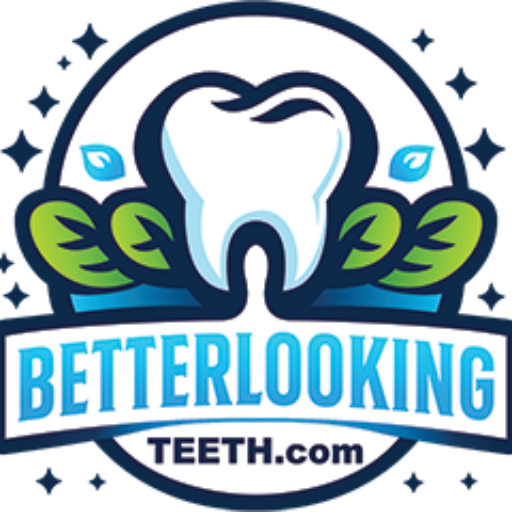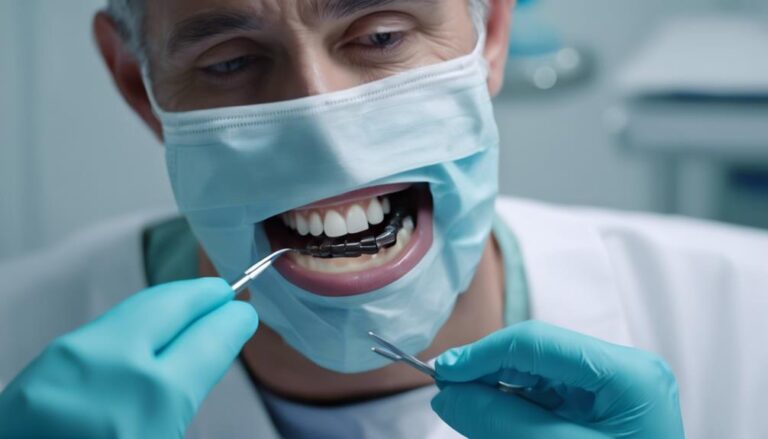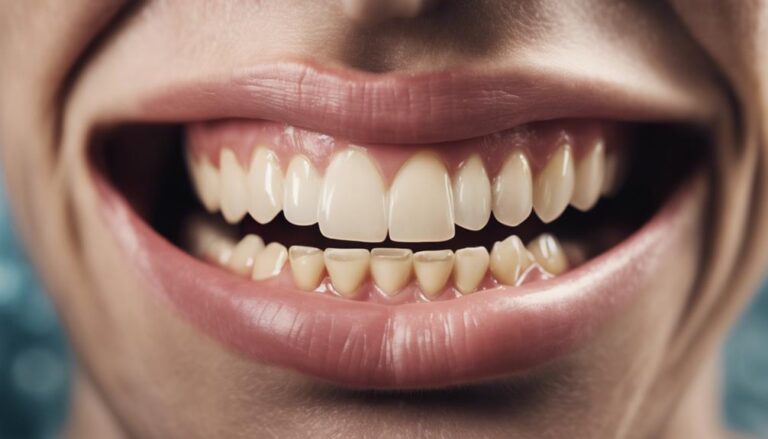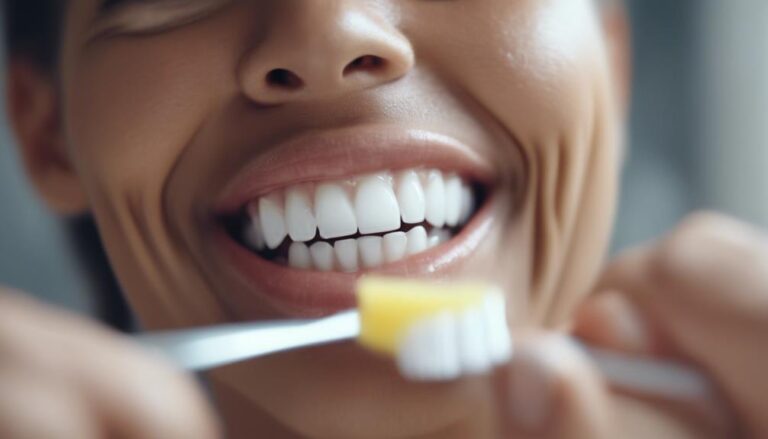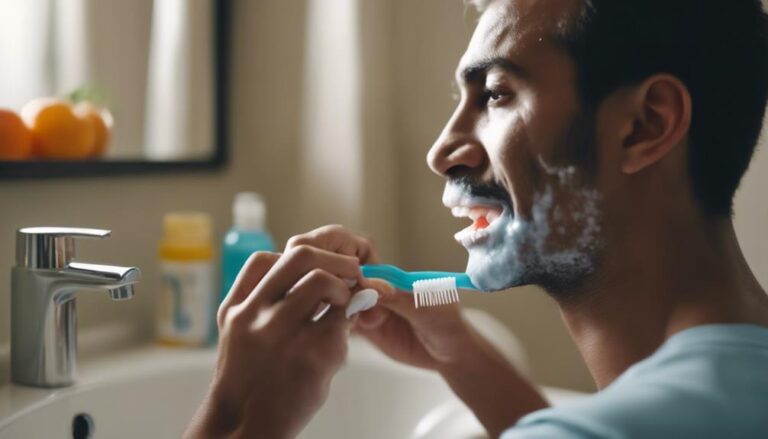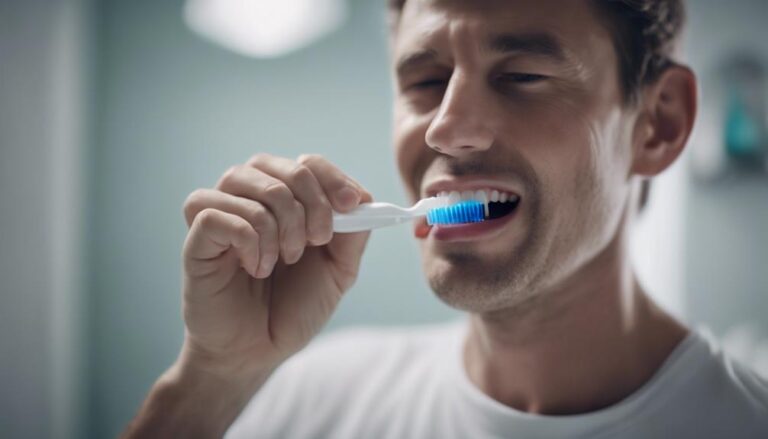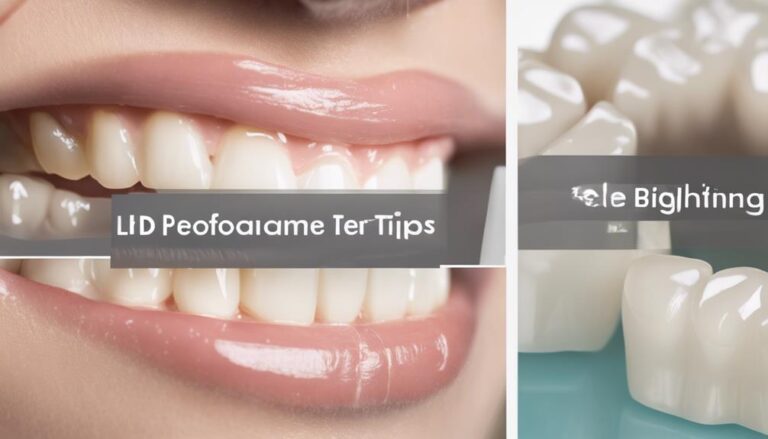Maintaining excellent oral hygiene is essential for preventing gum disease. Start with a balanced diet rich in vitamins and minerals like calcium and vitamin C. Limit sugary and acidic foods to avoid tooth decay. Proper brushing at a 45-degree angle towards the gum line and flossing between teeth using a zigzag motion are key. Mouthwash can reduce inflammation and kill bacteria. Using a tongue scraper helps freshen breath. Consider electric toothbrushes for thorough cleaning. Additional methods like herbal mouth rinse, oil pulling, antiseptic toothpaste, and dental probiotics can enhance gum health. Remember, a healthy diet is crucial for oral health.
Key Takeaways
- Use an electric toothbrush for thorough cleaning and gentle care.
- Incorporate herbal mouth rinse with antimicrobial properties for fresh breath and gum health.
- Practice oil pulling with coconut or sesame oil to reduce plaque and improve gum health.
- Consider antiseptic toothpaste for gum massage and pair with oral irrigators for deep cleaning.
- Integrate dental probiotics into your routine to balance mouth bacteria and prevent gum disease.
Importance of Oral Hygiene
Maintaining proper oral hygiene is essential for preventing gum disease and maintaining overall oral health. Nutrition impact plays a vital role in oral health. Consuming a balanced diet rich in vitamins and minerals, particularly calcium and vitamin C, can help strengthen teeth and gums, reducing the risk of gum disease. Additionally, limiting sugary and acidic foods can prevent tooth decay, which is a major contributor to gum issues.
Lifestyle habits also greatly impact oral health. Regular exercise not only benefits overall health but can also improve gum health by boosting circulation and reducing inflammation. Avoiding tobacco products is paramount, as smoking weakens the immune system, making it harder to fight off gum infections. Stress management is essential too, as high-stress levels can lead to teeth grinding or clenching, increasing the risk of gum disease. By paying attention to nutrition impact and lifestyle habits, one can significantly reduce the likelihood of developing gum disease and maintain excellent oral health.
Brushing Techniques
Proper brushing techniques are essential for effectively removing plaque and maintaining ideal oral hygiene. To guarantee you’re brushing your teeth correctly and achieving the best results, follow these guidelines:
- Hold Your Toothbrush: Hold your toothbrush at a 45-degree angle towards the gum line.
- Use Gentle Pressure: Avoid brushing too hard to prevent damage to the gums and enamel.
- Brush Thoroughly: Spend at least two minutes brushing all surfaces of your teeth, including the front, back, and chewing surfaces.
- Don’t Forget Your Tongue: Gently brush your tongue to remove bacteria and freshen your breath.
Adhering to proper technique while brushing can lead to more effective results in preventing gum disease. Remember, consistency is key. Brush your teeth at least twice a day, morning and night, for excellent oral health.
Flossing Tips
To guarantee thorough cleaning between your teeth and along the gum line, integrating proper flossing techniques into your daily oral hygiene routine is essential. Flossing should be done at least once a day to remove plaque and food particles that your toothbrush can’t reach.
When flossing, use about 18 inches of floss and wrap it around your middle fingers, leaving about 1-2 inches to work with. Gently slide the floss between your teeth in a zigzag motion, making sure to hug each tooth and move below the gum line. Be cautious not to snap the floss and harm your gums.
If traditional floss is challenging to use, consider flossing alternatives like water flossers or floss picks. Water flossers use a stream of water to clean between teeth, while floss picks have a small handle with a piece of floss attached, making it easier to maneuver. Both options provide effective cleaning and can be beneficial for individuals with dexterity issues or braces.
Mouthwash Benefits
Utilizing mouthwash daily can enhance oral hygiene by targeting bacteria in hard-to-reach areas of the mouth. Mouthwash benefits are significant for gum health and bacteria prevention.
Here are some key advantages of incorporating mouthwash into your oral care routine:
- Gum Health: Mouthwash can help reduce gum inflammation and prevent gingivitis by reaching areas that brushing and flossing may miss. This is essential for maintaining healthy gums and preventing gum disease.
- Bacteria Prevention: Mouthwash kills bacteria in the mouth, reducing the risk of plaque buildup, cavities, and bad breath. It can also help prevent infections and maintain overall oral health.
- Fresh Breath: Many mouthwashes contain ingredients that freshen breath by killing odor-causing bacteria. This can leave your mouth feeling clean and refreshed throughout the day.
- Added Protection: Some mouthwashes contain fluoride, which can strengthen tooth enamel and protect against decay. This added layer of protection can contribute to long-term oral health.
Tongue Scraper Use
When maintaining oral hygiene, incorporating a tongue scraper into your daily routine can effectively remove bacteria and debris from the surface of your tongue, promoting fresher breath and overall oral health. Tongue hygiene is often underestimated, but it’s an essential part of a thorough oral care routine.
Using a tongue scraper is simple; gently glide the scraper from the back of your tongue to the front, removing the buildup that can harbor bacteria and cause bad breath. This practice not only enhances oral hygiene but also helps prevent gum disease by reducing the amount of harmful bacteria in your mouth.
Water Flosser Benefits
Using a water flosser provides numerous benefits for enhancing oral hygiene and preventing gum disease. Research on gum health highlights the advantages of incorporating a water flosser into your daily routine. Here are some key benefits:
- Effective Plaque Removal: Water flossers can reach areas that traditional flossing might miss, helping to remove plaque and debris more thoroughly.
- Gentle on Gums: The gentle pulsating action of a water flosser is less abrasive on gums compared to traditional string floss, making it ideal for those with sensitive gums.
- Reduced Gum Inflammation: Studies have shown that using a water flosser can help reduce gum inflammation and bleeding, promoting healthier gums.
- Convenience and Ease of Use: With different pressure settings and nozzle options, water flossers are versatile and easy to use, catering to individual preferences and needs.
Incorporating a water flosser into your oral care routine can contribute significantly to maintaining excellent gum health and preventing gum disease.
Interdental Brushes
Interdental brushes offer a practical and effective solution for cleaning the spaces between teeth that regular brushing may not reach. These small brushes come in various sizes to fit different gaps between teeth. To use them effectively, gently insert the brush between your teeth and move it back and forth to remove plaque and food debris. This helps prevent gum disease by ensuring thorough cleaning in hard-to-reach areas.
In addition to cleaning, interdental brushes can also be used for gum massage techniques, which promote blood circulation and gum health. When using these brushes, selecting the right size for your interdental spaces is important to avoid damaging the gums.
While interdental brushes are highly effective, some individuals may find them uncomfortable to use. In such cases, interdental brush alternatives like soft picks or dental floss can be considered. Proper interdental brush maintenance, such as rinsing them after each use and replacing them regularly, is important for good oral hygiene.
Gum Stimulators
Gum stimulators enhance oral health by promoting circulation and stimulating gum tissue to maintain peak gum health. Using gum stimulators regularly can provide various benefits for oral health, such as:
- Gum Massage:
Gum stimulators offer a gentle massage to the gums, increasing blood flow and oxygen supply to the gum tissues, which aids in overall gum health.
- Plaque Removal:
By stimulating the gums, these tools help dislodge and remove plaque buildup along the gum line, reducing the risk of gum disease.
- Prevention of Gum Recession:
Regular use of gum stimulators can help prevent gum recession by strengthening the gum tissue and promoting its health.
- Improvement in Gum Sensitivity:
Gum stimulators can also help desensitize sensitive gums by gradually increasing tolerance to stimulation, resulting in reduced sensitivity over time.
Incorporating gum stimulators into your oral care routine can be a proactive step towards maintaining peak gum health and preventing gum diseases.
Electric Toothbrushes
To further enhance oral health and maintain excellent gum health, exploring the benefits of electric toothbrushes is a crucial step in your oral care routine. Electric toothbrushes offer several advantages over manual ones. They provide more consistent and thorough cleaning, as they often have built-in timers to guarantee you brush for the recommended two minutes. Electric toothbrushes can also be gentler on gums, reducing the risk of overbrushing and gum recession. However, some disadvantages include the initial cost and the need to charge or replace batteries.
When considering electric toothbrush brands, top options include Oral-B, Philips Sonicare, and Colgate. These brands offer a variety of models with features like different brushing modes, pressure sensors, and Bluetooth connectivity for tracking your brushing habits. It’s vital to choose a brush that suits your specific needs and preferences to maximize the benefits of using an electric toothbrush in your daily oral care routine.
Herbal Mouth Rinse
Utilizing a blend of natural herbs and botanical extracts, herbal mouth rinse serves as a beneficial addition to a well-rounded oral hygiene routine. Herbal mouth rinse benefits from the use of natural ingredients, providing a gentle yet effective way to maintain oral health. Creating a DIY herbal mouth rinse at home can lead to effective results, promoting fresh breath and healthy gums.
Markdown bullet list:
- Natural Ingredients: Herbal mouth rinse typically contains ingredients like peppermint, tea tree oil, and aloe vera, known for their antibacterial properties.
- Antimicrobial Properties: The natural components in herbal mouth rinse help in reducing bacteria in the mouth, preventing plaque buildup and gum disease.
- Fresh Breath: Herbal mouth rinses leave an invigorating sensation in the mouth, combating bad breath naturally.
- Gentle on Gums: Unlike alcohol-based mouthwashes, herbal mouth rinses are gentle on sensitive gums, making them suitable for daily use.
Oil Pulling Method
Incorporating the oil pulling method into your oral care routine can be a beneficial practice for promoting overall dental health and hygiene. This ancient technique, rooted in Ayurvedic practices, involves swishing oil around in your mouth to remove bacteria and improve oral health.
Coconut oil is a popular choice for oil pulling due to its known benefits, such as its antimicrobial properties that can help combat harmful bacteria in the mouth. However, if coconut oil isn’t suitable for you, alternatives such as sesame or sunflower oil can also be effective.
To practice oil pulling, simply take a tablespoon of your chosen oil and swish it around in your mouth for about 15-20 minutes before spitting it out. Make sure not to swallow the oil, as it can contain bacteria and toxins that have been pulled from your mouth.
Oil pulling has been praised for its effectiveness in reducing plaque, improving gum health, and freshening breath. Incorporating this method into your oral care routine a few times a week can be a valuable addition to your dental hygiene practices.
Antiseptic Toothpaste
When selecting an antiseptic toothpaste, it’s important to evaluate its active ingredients and their effectiveness in combating bacteria and enhancing oral health. When it comes to gum disease prevention, choosing the right toothpaste can make a significant impact. Here are some key aspects to keep in mind:
- Gum massage techniques: Look for toothpaste that promotes gum health through ingredients like fluoride or essential oils that can aid in gum massage techniques, improving blood circulation and reducing inflammation.
- Oral irrigators: Pairing your antiseptic toothpaste with an oral irrigator can provide a thorough approach to oral hygiene, ensuring that even hard-to-reach areas are properly cleaned.
- Natural remedies: Opt for toothpaste that incorporates natural remedies such as tea tree oil or aloe vera, known for their antibacterial and healing properties.
- Antibacterial mouthwash: Using an antibacterial mouthwash in conjunction with your antiseptic toothpaste can further enhance your oral hygiene routine by targeting bacteria that tooth brushing may miss.
Choosing the right antiseptic toothpaste alongside complementary oral care tools can play an essential role in preventing gum disease and maintaining good oral health.
Dental Probiotics
Dental probiotics offer a promising approach to promoting oral health by supporting the balance of beneficial bacteria in the mouth. These probiotics, often in the form of chewable tablets or lozenges, can help replenish the natural microbiome in the mouth, which plays a vital role in preventing gum disease and maintaining overall oral health.
The benefits of probiotics for oral health are vast. By introducing good bacteria into the oral cavity, probiotics can help combat harmful bacteria that cause plaque buildup, gum inflammation, and bad breath. They work by crowding out the harmful bacteria and creating a healthier environment in the mouth. This process can lead to a reduction in cavities, improved gum health, and fresher breath.
Incorporating dental probiotics into your daily oral care routine can complement traditional dental hygiene practices and provide an added layer of defense against gum disease. When used in conjunction with regular brushing, flossing, and dental check-ups, probiotics can greatly contribute to maintaining excellent oral health.
Healthy Diet Tips
To maintain excellent oral health and prevent gum disease, paying attention to one’s diet is essential. When considering healthy diet tips for gum disease prevention, there are several key factors to keep in mind:
- Meal Planning: Creating a well-balanced diet that includes plenty of fruits, vegetables, lean proteins, and whole grains is vital for supporting overall oral health. Planning meals ahead of time can help guarantee you’re getting all the necessary nutrients to keep your gums healthy.
- Nutritional Supplements: In some cases, it may be beneficial to incorporate nutritional supplements into your daily routine to support gum health. Omega-3 fatty acids, vitamin C, and calcium are examples of supplements that can help strengthen gums and prevent gum disease.
Regular Dental Check-ups
Regular dental check-ups play an important role in maintaining excellent oral health and preventing gum disease. As a vital aspect of preventative care, these routine visits allow dentists to detect early warning signs of gum disease, such as redness, swelling, or bleeding of the gums. During these check-ups, your dentist will also assess your overall oral hygiene practices and provide guidance on proper brushing and flossing techniques.
For many individuals, dental insurance coverage can help alleviate the financial burden associated with regular check-ups. It’s advisable to check your policy to understand what services are included and any out-of-pocket expenses you may incur. Remember, investing in these preventive measures can ultimately save you from costly treatment options for advanced gum disease down the line.
If gum disease is detected during a check-up, your dentist can recommend suitable treatment options, such as professional cleanings, scaling and root planing, or antibiotic therapy. By prioritizing regular dental check-ups and staying proactive about your oral health, you can effectively combat gum disease and maintain a healthy smile for years to come.
Frequently Asked Questions
Can Certain Foods Worsen Gum Disease?
Certain foods can worsen gum disease. Sugary and starchy foods feed harmful bacteria in the mouth, leading to plaque buildup. It’s essential to maintain a balanced diet and good oral hygiene to support gum health.
How Can Stress Impact My Gum Health?
Stress management plays a vital role in gum health. When stress spikes, it can weaken the immune system, making gums more vulnerable to inflammation and disease. Combining stress relief techniques with diligent oral hygiene practices is key.
Are There Specific Toothpaste Ingredients to Avoid?
When choosing toothpaste, I avoid harmful chemicals like triclosan, sodium lauryl sulfate, and artificial sweeteners. These ingredients can irritate gums and disrupt the mouth’s natural balance. Opt for toothpaste with fluoride and natural antibacterial agents.
Can Genetics Play a Role in Gum Disease?
Genetic predisposition can play a role in gum disease, but it’s not the sole factor. I maintain good oral hygiene habits to counter any potential risks. Regular brushing, flossing, and dental check-ups are crucial preventive measures.
Are There Alternative Treatments for Gum Disease?
Yes, there are alternative treatments for gum disease. Natural remedies like homemade mouthwashes and herbal supplements such as aloe vera and tea tree oil can aid in reducing inflammation and promoting gum health effectively.
Conclusion
In summary, taking care of your oral health is essential in preventing gum disease.
By following proper brushing techniques, flossing regularly, using mouthwash, and incorporating tools like a tongue scraper and antiseptic toothpaste, you can maintain a healthy mouth.
Remember to also consider dental probiotics, a healthy diet, and regular check-ups with your dentist to guarantee excellent oral hygiene.
Don’t let gum disease sneak up on you – be proactive in your dental care routine!
